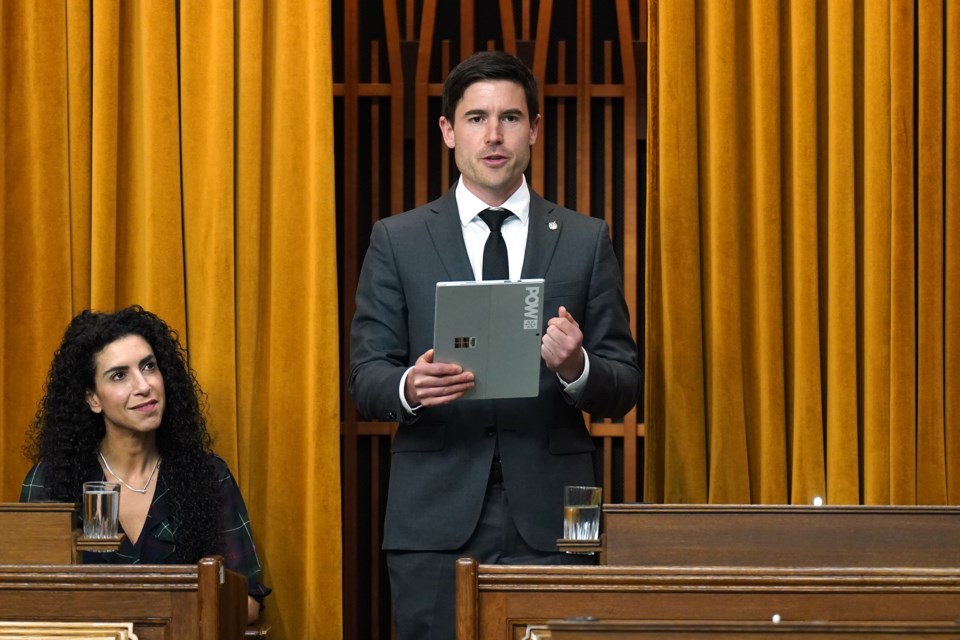West Vancouver–Sunshine Coast--Sea to Sky Country MP Patrick Weiler is downplaying continually strong polling numbers for the Conservative Party, saying the party has been better at tapping into constituents’ frustrations and channelling anger over issues that many incumbent governments around the world are facing.
Weiler, one of B.C.’s 15 Liberal Party MPs, credited the Conservative Party’s ability to get a message across, but doubted the party’s ability to actually solve the problems facing Canada.
“I think the Conservative Party has been very effective at tapping into that sense of insecurity and frustration that people have right now in Canada, of course without offering any real solutions to people, but really being able to amplify those challenges,” Weiler said.
Notably, Liberal Party support amongst Canada’s youth has fallen well behind their support for the Conservative Party, something Weiler said was a result of their vulnerability in the housing crisis.
“It’s one thing if you’re in the market and have a home, it’s another thing if you’re a young person looking to get into the market, and just seeing the challenges of getting a downpayment, and what you need to have saved to get into that,” he said.
The numbers are not pretty for the Liberal Party: recent polling by Mainstreet Research conducted in early November showed the number of Canadians between 18 and 34 that would vote Liberal is only 16.6 per cent, compared to 36 per cent that would support the Conservatives.
“I completely understand the frustration that a lot of young people have,” said Weiler, but he added younger voters are being drawn towards a Conservative Party they have little memory of living under.
“I think that for a lot of young people, particularly gen Z, they don’t remember what it was like to have a Conservative government under [Stephen] Harper. They don’t remember what that government did to roll back the rights of minorities, to completely turn its back on any work on fighting climate change, and so many other things.”
Weiler said Conservative leader Pierre Poilievre’s appeal is built on buzzwords, and he would be “much worse” than previous Conservative P.M. Harper, whose cabinet he sat in.
“Pierre Poilievre is so much to the right of Stephen Harper, as scary as that sounds,” Weiler said. “The conspiracy theories that he really caters to is something we should all be concerned about.”
Asked what theories Poilievre showed support for, Weiler named the Opposition leader’s ongoing criticism of the World Economic Forum by claiming it’s a “global conspiracy to control the world” as among the “very odd” ideas he has put forward.
Weiler also said Poilievre “sowed doubts” about vaccine effectiveness during the pandemic, and his statements that Canadians should invest in cryptocurrency to avoid inflation were signs of his embracing of fringe politics.
Broadly speaking on the low polling numbers for the Liberal Party, Weiler said he was “laser focused” on the issues driving those numbers, such as housing affordability, transportation, climate change, and cost of living pressures, saying that while Canadians are frustrated, the country as a whole is on sound footing to recover quickly because of its free trade deals, healthy resources sector, and economic diversity.
The Liberal Party recently announced its co-chairs for its National Campaign Committee, but Weiler said there was not much to read into, saying he expected the next election to be held in September 2025 due to the Liberal Party’s working relationship with the NDP.
“Certainly we’re not looking to have an election. I don’t think the NDP is, and I don’t think Canadians want an election right now,” he said.
“What we’re focused on as a government right now is dealing with the very real challenges we’re having in Canada … The necessity to keep taking action in tackling the housing crisis, and continuing to take action on global challenges that we have like climate change.
“I think particularly given what’s happening around the world and the instability we’re seeing globally, it’s really important that we have that sense of security and certainty in Canada.”




